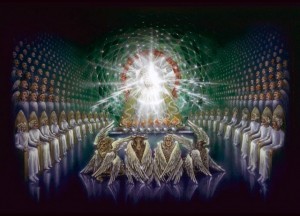In my last post, we looked at the hymn, “Come, Christians, Join To Sing” focusing on the last line of the first verse which says, “Praise is His gracious choice. Alleluia amen.” We saw from Scripture that it is God’s sovereign choice that really matters but we must be cooperative participants in relationship with God. We then looked at some of the biblical meanings and usages for the word praise in the book of Psalms. We concluded that praise is a response to God’s gracious invitation to us to lift our eyes to Jesus our Savior despite our feelings or circumstances.
In this and the next couple posts, we will be looking at 3 possible reasons for accepting God’s gracious invitation to lift our eyes to Jesus. So without further ado, let’s look at reason number 1 for accepting God’s invitation to praise.
Praise Gives Us Proper Perspective
When was the last time you gazed at the starry night sky? Some scientists estimate that we can see as many as 3,000 stars at night with our naked eye. (That is, if we are outside the city.) Most of the time when we step outside our houses, we do not give them much notice. Against the pitch-dark backdrop of the of the night sky, the stars appear as barely visible specks of light.

It is the same with God. God reveals just how big He really is through the prophet Isaiah saying, “‘For my thoughts are not your thoughts, neither are your ways my ways,’ declares the Lord ‘As the heavens are higher than the earth, so are my ways higher than your ways and my thoughts than your thoughts'” (Isaiah 55:8-9). And Paul, writing to the young pastor Timothy, says, “[…] [God] alone is immortal and who lives in unapproachable light, whom no one has seen or can see […]” (1 Timothy 6:16).
But so often, God is one of those dim specks of light against the pitch-dark backdrops of our lives. We fail to notice Him in the midst of our sin, disobedience, and life’s circumstances. Besides, there are other “lights” that appear closer and brighter.
In order to see our sin and life’s circumstances as they truly are, we must see God as He truly is. It is praise that enables us to zoom in and magnify the greatness and glory of God. When we do, all other things seem to fade away.
A Biblical Example…
Perhaps it was not a new revelation to the prophet Isaiah when he penned God’s words in Isaiah 55:8-9. After all, Isaiah had seen the Lord many years earlier.

We read his account in Isaiah 6:1-8:
In the year that King Uzziah died, I saw the Lord seated on a throne, high and exalted, and the train of his robe filled the temple. Above him were seraphs, each with six wings: With two wings they covered their faces, with two they covered their feet, and with two they were flying. And they were calling to one another:
“Holy, holy, holy is the LORD Almighty; the whole earth is full of his glory.”
At the sound of their voices the doorposts and thresholds shook and the temple was filled with smoke.
“Woe to me!” I cried. “I am ruined! For I am a man of unclean lips, and I live among a people of unclean lips, and my eyes have seen the King, the LORD Almighty.”
Then one of the seraphs flew to me with a live coal in his hand, which he had taken with tongs from the altar. With it he touched my mouth and said, “See, this has touched your lips; your guilt is taken away and your sin atoned for.”
Then I heard the voice of the Lord saying, “Whom shall I send? And who will go for us?”
And I said, “Here am I. Send me!”
I would like to make a some observations based on Isaiah’s account:
- Isaiah sees the Lord seated on His throne, “high and exalted”. In other words, Isaiah saw God as he truly is; there was nothing Isaiah needed to do to make God high and lifted up because God already is exalted.
- We see the angels modeling praise. Remember from my last post that all of the Hebrew words for praise demand exuberance, excitement, and passion! Their praise was so loud and exuberant that “at the sound of their voices the doorposts and thresholds shook”!
- Isaiah responds in worship. (We will explore the difference between praise and worship in a future post.) He realizes who he is in light of who God is. God is on the throne, high and exalted, and perfectly holy while in contrast, Isaiah is a sinner–a man of unclean lips.
- God is merciful and gracious. If we look at the Hebrew for Isaiah’s words, “I am ruined!” we find that it literally means, “I am about to be destroyed!” Isaiah knows that a holy God cannot have sinners in His presence but God takes away Isaiah’s guilt and makes atonement for his sin.
Seeing God As He Is
God has revealed to us who He is primarily through His Word. The Bible reveals that God is holy, loving, just, eternal, glorious, exalted, loving, gracious, and merciful. Those are just some of God’s characteristics which we would not have known apart from His Word.
Remember that praise is a response to God’s gracious invitation to us to lift our eyes to Jesus our Savior despite our feelings or circumstances. Regardless of circumstance or feeling, we remind ourselves through praise that God has revealed himself as holy, loving, just, eternal, glorious, exalted, loving, gracious, and merciful. We respond by celebrating, shouting and applauding, loudly commending and even dancing for joy because of who He is and what He has done for us. And in this way, we magnify our great and glorious God.